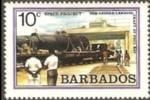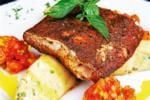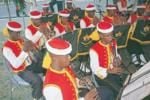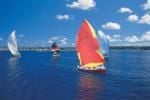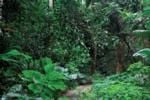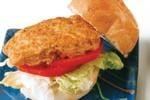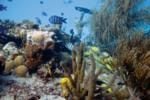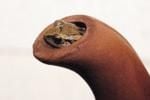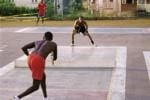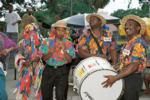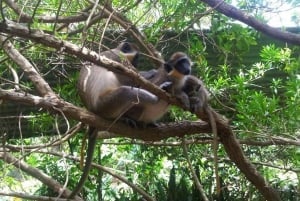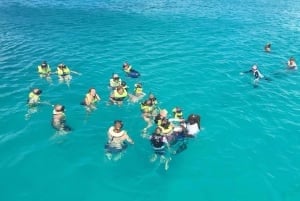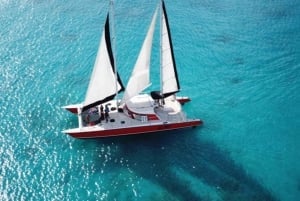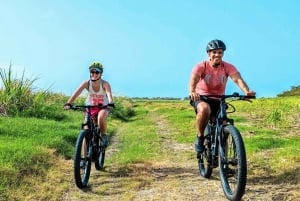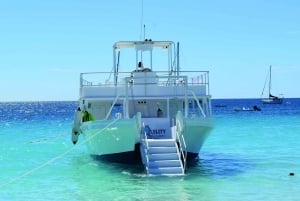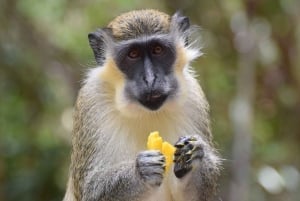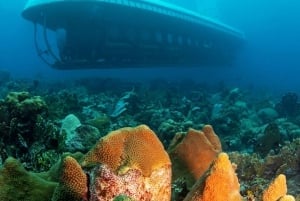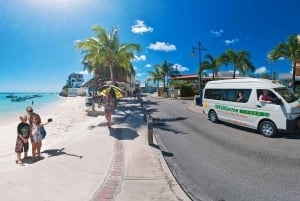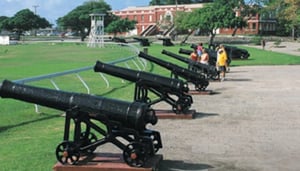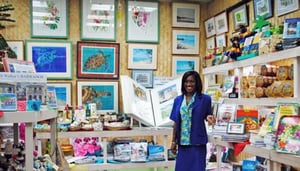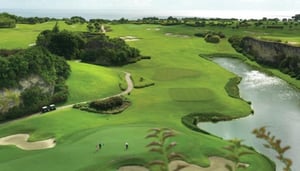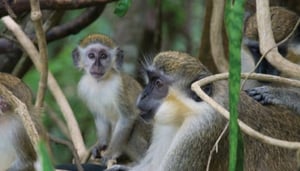A to Z of Barbados: N - Z
The A to Z of Barbados list continues with the yummy letter N and ends as every good vacation should, with some Zzzzzzzz's.
Or read about Barbados' unique
A - M.
N
National Dish - Cou-cou and flying fish represents the true
national dish in that it reflects the diverse groups of people that have formed the island's society. Cou-cou is a dish made with cornmeal and okras, in much the same way that is has been made in Africa for centuries. It is accompanied by flying fish which have been prepared in a aromatic sauce of tomato, onion, chives, thyme, fresh peppers, garlic and other herbs. Together they make a delicious and wholesome combination.
O
Observatory - The Harry Bayley Observatory is located in Clapham, St. Michael, and it is open to the public on Friday nights from 8:30 pm. This affords visitors an excellent opportunity for a light pollution free view of the night sky. The entrance fee: US$5 for adults and US$2.50 for children.
P
Philately - Barbadian stamps date back to 1852 and they are well sought after by collectors throughout the world. This small island has commissioned a prodigious quantity and range, of stamps, and first day covers from Barbados are highly prized. in 1994, Cot Printery, a local company, won the right to print stamps here in Barbados, thus becoming one of the only 12 commercial printers in the whole world eligible to print stamps. The Barbados Philatelic Bureau is located at the General Post Office, Cheapside, Bridgetown.
Pastries - For those with a sweet tooth, two old time Bajan specialities that are still made islandwide are coconut turnovers and jam puffs. Turnovers are slightly sweetened bread dough rolled with local golden sugar, grated coconut, and vanilla essence. Jam puffs are triangles of crispy, sugar coated puff pastry filled with imported strawberry jam.
Pork - In 1536, almost 100 years before actual settlement, the Portuguese captain, Pedro a Campos, left some pigs on Barbados to breed for the benefit of future visitors. From then on, Barbadians have never lost their love-affair with their porky friends.Traditionally, most households kept at least one pig to recycle food scraps, to sell when bills had to be paid, and to feed the family on special occasions. Nowadays, Bajans argue fiercely as to which vendors sell the best pork chops or ham "cutters" (sliced ham in a small loaf). By Richard "the lowdown" Hoad
Proverbs - Over the centuries in Barbados, the English language was infused with various African elements to eventually give rise to a Bajan dialect. Part and parcel of this new language was the ability to create highly descriptive expressions. This in turn has led to a whole host of Bajan proverbs. Here are just a few examples. Try to work out the meanings for yourself.
"De higher de monkey climb, de more ‘e show ‘e tail".
"Egg ain’t got no right at rockstone dance".
"Ol stick o’ fire don’ tek long to ketch back up".
"De berry don’ fall far from de tree".
Q
Quick TriviaDid you know that Barbados...
- Has produced more of the world's greatest cricketers and bodybuilders on a per capita ratio than any other place on earth?
- Was the world's only vacation destination serviced by a scheduled
Concorde flight?
- Can be found in the Guinness Book of Records for the world's smallest snake, "The Blind Snake"?|
- Is the only place outside the USA ever visited by
George Washington?
- Was chosen by the world renowned board-game "Trivia Pursuit" as the location for its international head office?
- Has an extraordinarily high proportion of centenarians?
- Is one of the most densely roaded countries in the world - many of which were originally tracks between canefields?
Quakers - were one of the earliest groups to oppose slavery. They were often persecuted for their non-conformist views and religious beliefs.
R
Road Tennis - This sport was played in Barbados as long ago as the 1950’s and is believed to have originated here. It is called road tennis because it was originally played on courts marked out on streets. A cross between table and lawn tennis, it can be called the poor man’s tennis. If a vehicle approaches while a game is in progress the game is halted and the "net man" stands the net on end at the road side. Since 1976 it has been recognised as a national sport, with its own association. The court is 20 feet long by 10 feet wide and there are written rules more similar to lawn tennis than table tennis. The game is known in several other Caribbean territories such as Trinidad, St. Lucia, St. Kitts, Antigua and Jamaica, as well as in some parts of urban New York, taken there by Barbadian emigrants.
Railway - Used to transport both goods and people, the railway first opened in 1881 and eventually ran between Bridgetown and Belleplaine on the East Coast, near Bathsheba. Sadly the railway was not a success due mainly to the use of inadequate equipment and railway tracks that certain places were built with a gradient that was too steep to climb and bends that were too sharp to negotiate. After many years of difficulties, the railway eventually stopped running in 1937 due to financial shortcomings and all of the equipment was sold to the Japanese as scrap, before World War II.
Rum Punch - The word punch is derived from the Indian word "panch" which means five. The five refers to the five elements of this delicious concoction: sour, sweet, strong, weak and bitters. The poem for the recipe goes "One of sour, two of sweet, three of strong, four of weak, five of spice, serve well chilled with plenty of ice." One measure of freshly squeezed lime juice, two measures of Barbados golden sugar syrup, three measures of Barbados rum, four measures of passion fruit juice and five dashes of Angostura bitters. Garnish with grated nutmeg. To make the syrup, heat the sugar with water for a couple of minutes, just until it comes to the boil. Of course rum punch can be made with water as the weak instead of passion fruit juice but this recipe is superior!
S
Salt Bread - The traditional local salt breads are rounded white rolls with a slightly chewy consistency and a finger-sized strip of coconut frond placed on top of each during baking to produce a decorative break in the top. Fish cutters, cheese cutters, ham cutters, fried egg cutters, even calves’ liver cutters, are all made with a Bajan salt bread and traditional yellow Bajan pepper sauce to taste. Fish sandwiches are also traditionally made with bakes, a fried bread. Fishermen often take bakes to eat while at sea and fill them with their own catch, which they filet and cook onboard using a portable kerosene stove.
Snow cones - Look out for the man on the bicycle with a large box over the front wheel. "Snow cones" are crushed ice served in a cup with a flavoured syrup of your own choice. A very inexpensive and refreshing treat on a hot afternoon.
Sugar Cane - As you drive around the island, sugar cane will be conspicuous by the great extent of its cultivation. Sugar cane is a variety of tall grass, which produces large amounts of sucrose (sugar) within its stem. The sugar cane is generally harvested between late January and early July, during the drier part of the year. It has an eighteen-month growth cycle and so at any time of the year you may see cane in various stages of development. After being harvested the cane is crushed to extract the juice, this is then boiled and allowed to crystallize into sugar. Rum and molasses are other cane products. Sugar cane was introduced in the 1630s and windmills were soon built to crush it. By 1651, the island had become a leading producer of sugar, making Barbados the prize in England's Caribbean colonies. Nowadays, only two sugar factories remain operative - Portvale and Andrews.
T
Tuk Band - Another uniquely Barbadian entity, the Tuk Band represents the classic folkloric band of Barbados. Made up of a bass drum, snare drum, penny whistle and a triangle, the band is frequently accompanied by lively characters such as the ‘Donkey Man’, ‘Shaggy Bear’, and a masked man dressed up as a woman with a huge ‘botsy’. This latter feature is wiggled with much gusto to the great amusement of the crowd. If, as has been theorised, the Tuk Band has its origins in the fife and drum band of the British military, there can be no doubt that the resultant Barbadian version owes most of its characteristics to African influence.
Trafalgar Square - Lord Nelson's Bronze Statue by Sir Richard Westmount in Barbados' Trafalgar Square was erected in 1813, 27 years before Nelson's column in London's Trafalgar Square. Nelson assembled his ships in Carlisle Bay in Barbados, to go to the Battle of Trafalgar. A fleet of Spanish and French set out to capture Barbados and on seeing Nelson's fleet quickly abandoned the plot and turned back. Barbadians were eternally grateful to Nelson and so erected his statue as a lasting testament.
U
Underwater Park - Folkstone Park on the
west coast, St. James, is an underwater conservation area for snorkellers. At the same location there is also a Marine Museum.
V
Vegetation - Barbados was originally covered with forests, a mixture of evergreen and deciduous trees. However, even from the earliest days of settlement, the trees were cut down for timber for construction and firewood. In addition, the land was cleared to make way for agriculture, especially during the boom years of sugar production. Consequently, very little of the original forest cover remains today. In fact, the only remaining example would be Turners Hall Wood in St. Andrew. Fortunately, in more recent times a great effort has been made to preserve and replant trees.
W
Whistling Frog - There is only one true frog in Barbados and this is the tiny whistling frog. They team up with the crickets to fill the evenings with their music. What is particularly interesting about this finger nail sized frog is the fact that it has no need to return to water for reproduction. The young frogs hatch right out of the clutch of eggs laid under damp stones and leaves.
Warri - Believed to be one of the world's oldest known games, Warri originates from Africa and has presumably been played in Barbados since the early days of slavery. The game is played on a wooden board which has two rows of six depressions, each one representing a "house". Each player has a number of seeds or similar objects which represent his "men", and these are placed in the "houses". Having once been in danger of disappearing from society, the game of "warri" is now experiencing a resurgence in popularity.
Windmills - At one time the landscape of Barbados was liberally dotted with windmills. Cut sugar cane would be brought to the plantation and dumped in the mill yard. Labourers fed small bundles of the cane into the metal rollers which were driven by the power of the wind catching the sails of the mill. The rollers crushed the cane and squeezed the juice into a channel to be carried to the boiling house, ready for making sugar. There are still quite a few old mill walls to be seen around the countryside but the only completely intact examples is the mill at Morgan Lewis in St. Andrew.
X
Xmas (Christmas) - Christmas is celebrated in Barbados in much the same way as it is traditionally celebrated in most of Europe, North America and other parts of the world. Perhaps, the biggest difference is that we can go to the beach for a swim on Christmas Day, instead of building a snowman in the garden. Otherwise, Santa Claus, Christmas trees, gifts and a turkey dinner are all part of our festivities. We do, however, add our own little touches like "jug-jug", a dish made mainly with pigeon peas, guinea corn and salt meat, served along with the tradional Christmas fare. We also have a special, festive Christmas drink made with Sorrel. Sorrel flowers are dried and then soaked in boiling water and spices. The resultant red drink is sweetened to taste and stored in bottles. It will usually ferment slightly and so add a pleasant effervescence.
Y
Yachting - Yachting enthusiasts may wish to meet their Barbadian counterparts while visiting the island. The quickest way to do this would be to contact either the Barbados Yacht Club, Bay Street, St. Michael (T: +1 (246) 427 1125) or the Barbados Cruising Club, Aquatic Gap, St. Michael (T: +1 (246) 426 4434).
Z
Zouaves - The band of the Barbados Regiment today wears the same Zouave uniform that was presented by Queen Victoria to the West India Regiment in 1858, in honour of their distinguished service in the African Ashantee wars. The Zouaves were a detachment of French Colonial Light Infantry made up of members of the Zouaoua tribe of Algeria. The Queen had been impressed by the fighting record and beauty of their uniform and wanted one of her own regiments to look the same. Over the course of time the right to wear the Zouave uniform has been passed on to the band of the Barbados Regiment.
Zzzzzzz's - A popular Bajan habit especially after a big lunch!



